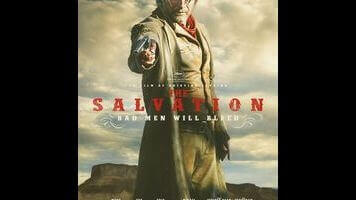Mikkelsen plays Jon, a veteran of the Second Schleswig War—in which his native Denmark was defeated by Austria and Prussia—who has gone out West with his brother (Mikael Persbrandt) in search of a new life. After seven years of hard work, Jon is finally able to bring over the wife and son he left behind in Denmark, but they’re kidnapped and murdered en route to the new homestead outside of tiny Black Creek. Jon takes swift, unflinching revenge on the killers, only to discover that one of them is the brother of Delarue (Jeffrey Dean Morgan), the vicious leader of a band of hired guns who are being paid to harass the locals on behalf of a couple of businessmen.
Headquartered in an abandoned bank—one of the only buildings left standing in a burned-out nearby ghost town—Delarue is like a dragon living on his hoard of gold, periodically swooping into town to claim human sacrifices. There’s even a mute “princess” (Eva Green, giving one of those sublime, borderline-camp performances that are her stock-in-trade), who lives with Delarue’s band as something halfway between a prisoner and reluctant member. It’s a grotesque, distinctly Euro-fairy-tale take on American myth. It’s also relentlessly pessimistic.
It’s been said that the Italians were so good as deconstructing and subverting the imagery of the West, because they weren’t dealing with their own history, and didn’t feel obligated to root for anyone. The Salvation, a Danish co-production shot in South Africa, fits itself right into that tradition. In the figure of Delarue—an ex-soldier like Jon, famed as an Indian-killer—it manages to combine the gruesomeness of the Indian wars and the deadly lawlessness of the bootstrap West with a sinister future lurking just around the corner, represented by Delarue’s shadowy employers, whose motivations are only revealed in the movie’s swooping final shot. In the people of Black Creek, it finds hypocrisy and short-sighted selfishness—a community willing to to let killers walk with impunity in exchange for a shot at having a little plot of land to call their own.
With the exception of a stagecoach scene that brings to mind the sloppy rear-projection of yesteryear, The Salvation is brutally handsome. Levring, one of the original signatories of the Dogme 95 filmmaking manifesto, embraces nuts-and-bolts genre craft, putting the movie’s mock-Techniscope look to use in the action scenes and shoot-outs, which take full advantage of the way space stretches and distorts as the camera gets closer. There’s no harmonica-flavored faux-Morricone score, no cutesy references; this isn’t an homage, but a director putting an outmoded genre style to work in a brisk, violent frontier flick.

 Keep scrolling for more great stories.
Keep scrolling for more great stories.
